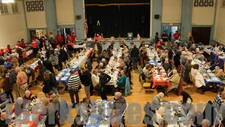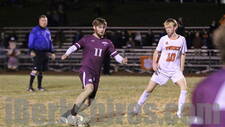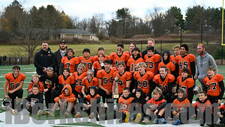Young At WarBy Jen Thomas
12:00AM / Thursday, March 22, 2007
North Adams - When U.S. bombs began battering Iraq four years ago, students currently enrolled at the Massachusetts College of Liberal Arts were younger, both in years and perspective.
Time has made a difference.
“In the beginning, I was fearful,†said Monica Henry, a senior Arts Management major from Orange. “None of it made sense to me.â€
“The whole run-up to the war was bizarre,†said Sean McHugh, a junior transfer student from Williamstown, who is taking classes in history and journalism as part of his Interdisciplinary Studies major.
“It didn’t affect me too much,†said Jennifer Chinn, a freshman from North Andover. “It wasn’t until later in high school that I got more involved.â€
Four Years In Iraq
Tuesday marked the fourth anniversary of the invasion of Iraq. On March 20, 2003, President Bush launched Operation Iraqi Freedom, a campaign of American and coalition forces whose mission it was “to disarm Iraq of weapons of mass destruction, to end Saddam Hussein's support for terrorism, and to free the Iraqi people,†according to the president’s radio address that fateful morning.
College students have come of age accompanied by devastating news stories of destruction and death in the Middle East, while also struggling to come to terms with the perpetual ambiguity of the Bush administration’s comments on the war. This year’s college freshmen were barely teenagers when the terrorist attacks of 9/11 challenged the country’s notion of American infallibility, and those same students were just finishing their first year of high school when U.S. forces began the “Shock and Awe†campaign that opened the war.
Today, as young adults, these students have developed an increasingly defined perspective on what the war means, especially as personal involvement becomes a factor.
The "Boy Next Door" At War
Chinn’s boyfriend, U.S. Marine Corp Corporal Michael Wilson, has been stationed in Iraq since Sep. 1, 2006.
“It brings the war closer to you,†she said. “It’s been tough, but you have more of an understanding of it.â€
Chinn expects Wilson to return home in May, but she fully supports a continued military presence in the Middle East.
“People need to realize that, if you bring the troops home, that’s bringing the war home, too,†she said. “It puts people in the U.S. at risk.â€
Chinn shared her disappointment at an increasing American disapproval of the war, saying that it hurts the soldiers’ morale.
“The troops feel like they’re wasting their lives, that they’re fighting for nothing,†she said. “How can you protect Americans when they don’t support you?â€
Henry doesn’t understand this sentiment, she said. While she harbors no animosity for the troops fighting in Iraq, she wholeheartedly advocates for their safe return.
“To bring the troops home now seems like an irresponsible view, but how much longer can we keep this up?†she asked.
The actual invasion of Iraq lasted less than a month, and Baghdad fell on April 9, 2003. On May 1, aboard the USS Abraham Lincoln, the President delivered his now famous “Mission Accomplished†speech, in which he declared “Major combat operations in Iraq have ended. In the battle of Iraq, the United States and our allies have prevailed.â€
After the removal of Saddam Hussein, troops struggled to rebuild the war-torn country amid a dangerous Iraqi insurgency and threats of an impending civil war. There are no official estimates on the human cost of the war, but the Iraq Body Count, an online database, claims this just completed fourth year has been the worst for Iraqi civilian deaths. In a March 18, 2007 press release, they claimed “almost half (44 percent) of all violent civilian deaths after the initial invasion phase occurred in the just-ended fourth year of the conflict.â€
In 2006, when a friend in the military talked about an incident during which he was blown from a truck in Iraq, Henry was devastated. She believes Iraq should have been handled as a special forces operation, not a full escalation of coalition forces.
“I just don’t support violence,†she said.
"We Will No Longer Tolerate, We Will No Longer Negotiate"
George Bianchi, a freshman history major from Attleboro, views the war as an overall success.
“What the brave men and women of the coalition forces did was important. We finally pulled our heads out of the sand; we finally stood up to the brutality and said, ‘As the freedom loving people of the world, we have had enough,’†he said.
“And to those who commit atrocities, we as a nation must say that we will no longer tolerate, we will no longer negotiate, and we will no longer be afraid. It is the time for those who would use terror and oppression to be afraid.â€
Bianchi focused on the removal of Saddam Hussein as the great accomplishment of the last four years, stating “we removed one of the world’s cruelest dictators.â€
For this reason, Bianchi thinks the U.S. needs to remain in Iraq, because “hope remains.â€
“We need to finish this to the very end – no matter how many lives are lost,†Chinn said.
“These Are Real Peopleâ€
“The idea of bombing civilians with a goal of fighting terrorists and finding weapons of mass destruction is the worst idea,†said Henry. “Do they look at other people as real people when they’re dropping these bombs?â€
“To me, this is completely pointless,†she said. “We ruined the lives of an entire country of people. It’s so awful that we did that to them. We hear everyday the number of people who were killed, and we’re pursuing them as a goal. These are real people.â€
“Militias are murdering people in their homes and kidnapping people in public,†McHugh said. “There’s so much going wrong there, and we let everything go to hell.â€
“Human life just doesn’t matter anymore,†Henry said.
The Good, The Bad, And The "When Will It End"
“Nobody hears the good things that are happening,†Chinn said.
She related stories of rebuilding community centers and schools and talked about the reconstruction efforts.
McHugh thinks this view is absurd.
“That’s like saying, “Yeah, we killed 20 people, but the 21st survived and we gave him a band-aid. Then, no one talks about the band-aid,’†he said.
Bianchi thinks the political climate of the country will shift after the 2008 presidential elections, but the others aren’t so sure.
Henry said she consistently worries about the daily human death toll, while McHugh thinks the current administration has botched the situation so badly that withdrawal seems unlikely.
Four years, and still no end in sight.
Jen Thomas is a senior at the Massachusetts College of Liberal Arts and a correspondent for iberkshires.com .
|


















